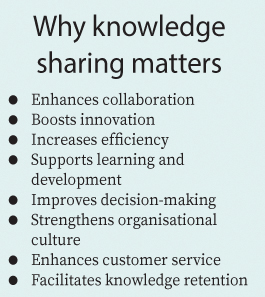The phrase “knowledge is power” reflects its significance in driving success in every area of life—whether professional, personal, or academic. However, knowledge becomes powerful when shared with others. In today’s world, knowledge is a vital asset. It’s a crucial way to encourage innovation, collaboration, and progress across society. It brings benefits to both the giver and receiver and stimulates creativity, strengthens communities, and leads to personal growth and success in organisations.
Building connections
 Humans are inherently social creatures. We progress by forming connections and working together. Much of human advancement can be attributed to the ability to communicate and pass on knowledge. From ancient traditions passed down through stories to the modern age of digital platforms, sharing knowledge has always been at the core of progress.
Humans are inherently social creatures. We progress by forming connections and working together. Much of human advancement can be attributed to the ability to communicate and pass on knowledge. From ancient traditions passed down through stories to the modern age of digital platforms, sharing knowledge has always been at the core of progress.
In educational settings, knowledge-sharing is the foundation of growth. While teachers impart wisdom, peers contribute by exchanging ideas, debating issues, and sharing perspectives. This form of collaboration not only strengthens learning but also builds habits that are essential for the working world. Teams in professional settings function more effectively when individuals freely share information, insights, and skills with one another.
Sharing knowledge builds trust and creates meaningful relationships. It strengthens the bond between colleagues, makes teams more efficient, and enhances overall productivity. When someone shares their expertise, they’re not just helping others—they are creating an environment where learning is a shared experience. In doing so, they also receive new insights or perspectives that they may not have considered before.
Sparking innovation and creativity
Innovation thrives on the exchange of ideas. No major discovery or breakthrough happens in a vacuum. Progress is often the result of collaborative efforts, where people from various backgrounds share their knowledge to tackle challenges in new ways. By sharing information freely, creativity is unlocked, allowing for novel approaches to problems and unforeseen opportunities.
Think about industries like technology. The most innovative companies often have cultures that encourage open dialogue and knowledge-sharing. For example, engineers at a tech company might brainstorm new solutions to a problem, drawing from each other’s knowledge and expertise. What begins as a simple exchange of ideas can eventually lead to cutting-edge products or solutions that wouldn’t have been possible if everyone worked in isolation.
On the flip side, if individuals or teams keep their knowledge to themselves, the organisation suffers from stagnation. When competition and secrecy override the sharing of insights, progress is hindered. The culture of organisations like those in Silicon Valley, where collaboration and open communication are valued, shows that sharing knowledge leads to groundbreaking advancements. Ultimately, sharing ideas can transform a fleeting thought into a revolutionary concept, pushing industries forward.
Personal growth through teaching others
An often overlooked but crucial aspect of sharing knowledge is how it helps the individual doing the teaching. When you teach someone else, you’re forced to better understand and clarify your own knowledge. This leads to personal growth and a deeper mastery of the subject matter. Teaching others can also shine a light on areas that need improvement, driving individuals to learn more and refine their expertise.
This phenomenon is commonly observed in educators and mentors. Many teachers find that explaining a topic in detail deepens their understanding of it. Similarly, professionals who take on mentorship roles often discover that guiding others through complex challenges keeps their own skills sharp.
Sharing knowledge helps build one’s reputation. In professional settings, people who are known for their willingness to offer insights, explain difficult concepts, and provide guidance tend to be more respected. They are often sought out for advice, which can lead to better career opportunities and leadership roles. Whether in small team settings or across entire industries, the act of sharing knowledge can significantly enhance one’s professional standing and open doors to advancement.
Creating organisational success
Organisations that cultivate a culture of knowledge-sharing tend to be more successful. In a competitive business environment, knowledge is an incredibly valuable asset. However, for organisations to truly benefit from it, knowledge needs to be shared widely within the company. When employees share their expertise and skills with one another, they create a workplace where continuous learning is encouraged.
This culture of learning boosts morale and job satisfaction, as employees feel valued and see how their contributions make a difference. It eliminates the risk of information bottlenecks, where critical knowledge is restricted to a few people. By ensuring that knowledge is passed around, companies become more resilient and better able to adapt to changes in the market.
Knowledge-sharing is particularly vital during transitions, such as when employees leave or new team members join. If knowledge remains with just one individual, the organisation suffers when that person leaves, leading to inefficiencies and costly delays. By sharing expertise throughout the team, companies ensure continuity and stability, allowing new employees to get up to speed more quickly.
Knowledge sharing in Digital Age
In today’s digital landscape, the potential for knowledge-sharing has expanded tremendously. The internet, social media, and various collaborative tools have made it easier than ever to share insights and information globally. Whether through blogs, webinars, or forums, people can share their knowledge with others across borders in real-time.
The democratisation of knowledge means that access to information is no longer limited by geography or social standing. Anyone can contribute to and benefit from this global exchange of ideas. Platforms such as LinkedIn, YouTube, and online learning hubs have made it possible for individuals to share their expertise and help others grow.
However, with this vast access comes the challenge of ensuring the quality of shared information. As more people contribute to the pool of knowledge, it becomes crucial to verify the accuracy and relevance of the information being shared. Both the person sharing and the receiver must ensure that they are disseminating and consuming reliable and truthful knowledge.
Lasting impact
Sharing knowledge often creates a ripple effect—an initial act of sharing can influence and benefit countless others over time. Consider a seasoned professional who mentors a young colleague. That colleague might take the lessons learned and apply them in ways that benefit their team or even the larger organisation. Over time, this cycle of learning and sharing continues, leading to far-reaching positive impacts.
Knowledge-sharing empowers individuals to contribute meaningfully to their work, communities, and broader industries. It’s an ongoing cycle that fosters growth, innovation, and collaboration. The more people share their knowledge, the more others benefit, leading to exponential growth in learning and progress.
The true power of knowledge lies in sharing it. People who willingly share what they know stand to gain much more than just a sense of satisfaction—they foster innovation, help build stronger communities, and contribute to personal and professional growth. When individuals, teams, and organisations prioritise knowledge-sharing, they create environments that thrive on creativity, problem-solving, and shared success.
Sharing knowledge isn’t just a generous gesture; it’s an investment in a better future. Through collaboration and communication, we drive progress that benefits everyone, leading to a world where learning and innovation know no limits.









